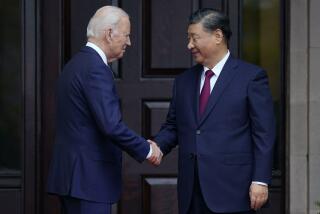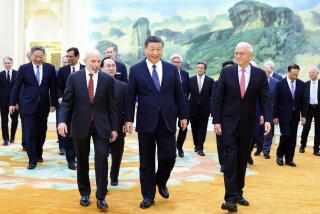Obama, Chinese president try to show cooperation amid tensions
Reaching new common ground on trade and taking an intimate palace stroll, President Obama and his Chinese counterpart put a sunny gloss on U.S.-Chinese relations Tuesday and tried to downplay months of strains over cyber-espionage, political protests and territorial disputes.
Obama and Chinese President Xi Jinping met privately for the first time during Obama’s three days of diplomacy and stagecraft timed to an economic summit in Beijing. The leaders greeted each other with warm welcomes and assurances. Obama said he wanted to “take the relationship to a new level.”
Xi took the president for a walk around the blue-lighted imperial gardens of Zhongnanhai, his residence near Beijing’s Forbidden City.
Both leaders have an interest in playing up their ties, even if they are tenuous. With his political influence waning at home, Obama is looking for even incremental progress abroad and sees Asia trade deals and climate talks as fertile territory. Plus, China’s cooperation on big-ticket items, such as an Iran nuclear agreement, is pivotal.
For Xi, Obama represents both an opportunity and competition. A dynamic leader, Xi has hoped to use the meeting to show off his increased engagement in international affairs and relationship with world leaders. He’s also demonstrated a willingness to defy the United States.
The men were due for a more formal sit-down and statements Wednesday, when they are expected to tout areas of agreement, possibly ongoing climate change discussions or military cooperation.
The talk of fresh agreement began Tuesday. Obama announced a breakthrough on the Information Technology Agreement, a global trade pact. The new deal would eliminate more than 200 tariffs on tech products and could generate up to $1 trillion in additional trade yearly. Obama announced the progress at the Asia-Pacific Economic Cooperation summit in Beijing and thanked Xi for his work.
The U.S.-China agreement should speed up final ratification by World Trade Organization members at a meeting in Geneva in December, Obama said.
“That’s good news. And I very much thank President Xi’s efforts in that regard,” Obama said.
Despite the warm words, trade remains a prickly subject between the two nations and the leaders’ itineraries showed the split that persists. On the sidelines of the APEC summit, both the U.S. and China held meetings on separate trade pacts in progress: the China-led Free Trade Area of the Asia-Pacific and the deal some view as a rival, the U.S.-led Trans-Pacific Partnership, which excludes China and Russia.
Obama put a positive spin on the dueling agreements, calling the TPP just another “contribution” to the goal of free trade across the Asia-Pacific region.
“I look forward to the day when all of our economies can be linked together in a high-standard, 21st century agreement,” he said. “And I think that the work and the efforts of President Xi in setting this agenda here today will help facilitate that.”
Obama and Xi have tried to show off their warm relations before, with limited effect on policy. In 2013, Obama hosted Xi at Sunnylands estate in Rancho Mirage, Calif. Officials from both countries said the more casual, get-to-know-you session was fruitful. The Chinese declared that the leaders had “blazed a new trail.”
It led, however, to familiar conflict. Since then, the U.S. has accused Chinese hackers of targeting American companies and decried Chinese military aggression in territorial disputes. In China, anti-American sentiment has been on the rise and the Xi government was angered by U.S. statements in support of pro-democracy protesters in China-controlled Hong Kong.
White House officials say they still believe there is room for agreement, even as these and other issues fester. They still have hope that the rise of the man some in China call “Uncle Xi” would mark a shift.
Xi cuts a much more dynamic figure than his predecessors and has some of the common touch that once distinguished Obama. He made headlines this year just by dining at a typical steamed-bun restaurant in Beijing, for example, and braving the capital’s air without a mask on a particularly smoggy day. A photographer captured him last year holding his own umbrella in the rain, his pant cuffs rolled up. The picture recently won a top news photography prize in China.
His policies, too, seem to have won public support. In particular, Xi’s implementation of a far-reaching anti-corruption campaign has strong support among ordinary Chinese frustrated by years of profligate graft by officials at every level of the Communist Party.
Xi professes an uplifting message, rarely missing an opportunity to invoke his catchphrase, “the Chinese Dream,” which seems to exhort individuals to pursue their own goals but also underscores a mission Xi has described as “the great revival of the Chinese nation.” Some view that as a counterbalance to Obama’s effort to strengthen U.S. influence in Asia by shifting resources and attention to the region.
Upon arrival in Beijing, Obama tried to assure the Chinese that his increased attention is not a threat. In an interview with the official New China News Agency, Obama declared he was not trying to “contain” China.
The choice of news outlet and the repeated praise of Xi left some wondering whether Obama would pull his punches on matters of censorship and human rights for the sake of smoother relations.
Past U.S. presidents overtly emphasized such themes during visits to China, by mentioning those issues in speeches and other forums that were broadcast nationally there. President Clinton, in a 1998 news conference with Jiang Zemin, raised such thorny matters as the Tiananmen Square massacre and encouraged Beijing to resume a dialogue with the Dalai Lama, the exiled Tibetan spiritual leader.
Chinese dissidents and activists have hoped Obama would make similarly forceful remarks on China’s human rights record before leaving late Wednesday.
Obama may still decide to make such a statement and it could serve him politically both at home and abroad, said Hu Jia, a prominent dissident.
For the Record
Nov. 11, 4:38 p.m.: An earlier version of this post incorrectly identified the speaker who commented about whether President Obama will comment on China’s human rights record. The speaker was Hu Jia, a prominent dissident, not Hu Xingdou, professor of economics and China issues at the Beijing Institute of Technology.
The dynamic between the U.S. and China has been changing as China’s economic strength and political clout grow, he said.
“But this shouldn’t be an excuse for the U.S. to be softer on human rights issues,” he said. “Instead of trying to bow down to China or make concessions, the U.S. would look much stronger if it would stand up on these issues and underscore core American values.”
Parsons and Makinen reported from Beijing and Hennessey from Washington.
For more White House coverage, follow @cparsons and @khennessey
Follow @JulieMakLAT for news from China
More to Read
Start your day right
Sign up for Essential California for news, features and recommendations from the L.A. Times and beyond in your inbox six days a week.
You may occasionally receive promotional content from the Los Angeles Times.









